- Author Jason Gerald gerald@how-what-advice.com.
- Public 2024-01-19 22:11.
- Last modified 2025-01-23 12:04.
Accessing a work computer from home is more complicated than accessing a home computer from other devices. Most companies have security systems in place to prevent strangers from accessing sensitive information from outside the company network. To be able to access your work computer, you need to obtain company permission to have remote access to the network through software called Virtual Private Network or VPN.
Step
Method 1 of 2: Installing VPN on Work Computer

Step 1. Request remote access for your work computer
Many companies require their employees to ask permission before they can access a VPN. Contact the IT (Information technology) department or visit the company's IT website to request access.
- Depending on your type of job and the company's internet security policies, the IT department may be able to help you right away.
- If the IT department requires you to have a supervisor's permission, contact him and ask him to make a request on your behalf.
- You may need to provide a username and password to be able to request access.
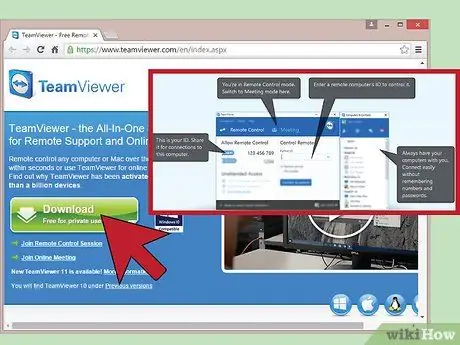
Step 2. Install the VPN software on the work computer
Virtual Private Network software needs to be installed on your work computer so you can work from home. Visit the IT site and look for the software download link and installation guide. Software installation is usually done by yourself.
- The VPN software guide for Windows may differ from Mac. Make sure you read the correct manual for the operating system you are using.
- If the IT department didn't set up a work computer for you, a technician may give you instructions so you can do it yourself.
- Call or email the company's support service if you have any difficulties with installation or configuration.
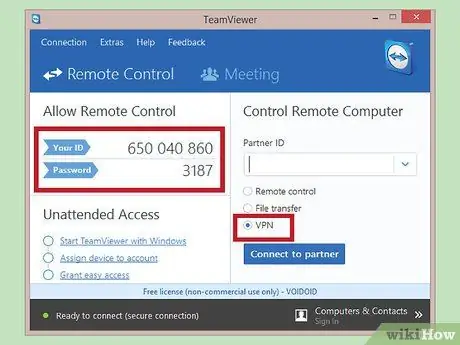
Step 3. Connect to the VPN
Once installed, the VPN program needs to be activated. On your PC, go to Start → Programs, then find the name of the installed VPN software. Double-click the VPN client to open it. You will be asked to enter a username and password. This step varies depending on company policy.
- If you are using a Mac, go to the " Applications " folder and click on the installed VPN software.
- Your VPN may connect automatically once installed. Read the program installation guide or contact your company's IT department.
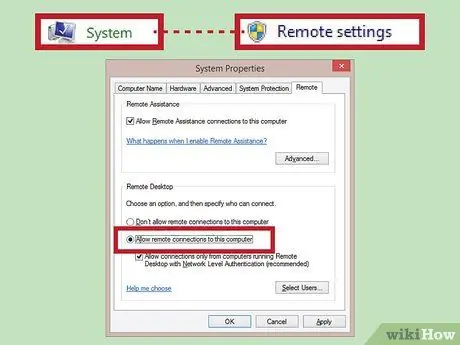
Step 4. Enable Remote Desktop on the work computer
Remote Desktop allows other computers to connect to your work computer. For Windows users, click Start → Control Panel → System → Remote Desktop. Check the box that says "Allow users to connect remotely to this computer".
- Write down the full name of the work computer. You'll need it later when connecting from home. Your computer name should be listed under the checked box.
- If you are using a Mac, visit the Mac App Store and download "Microsoft Remote Desktop"
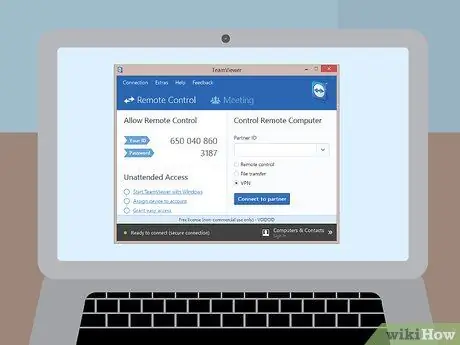
Step 5. Leave your computer to work when going home
Work computers need to be connected to a network to be accessed remotely. Launch the Remote Access program on the work computer if needed. It all depends on how the IT department has configured your network.
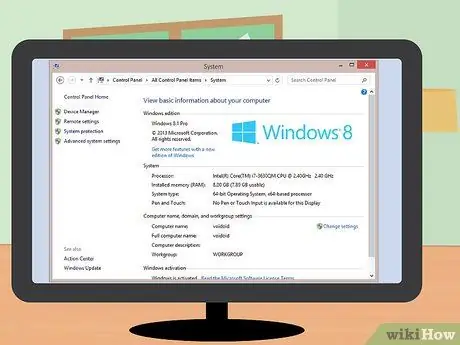
Step 6. Check the system requirements of the home computer
Before you install a VPN program on your computer, make sure that your home computer meets all system requirements. Requirements will vary by company. The usual requirements are the latest operating system and a certain amount of RAM (hard disk space). Requirements for Mac and Windows vary.
- System requirements are usually available on the IT site.
- Call the IT department or email if you have any questions.
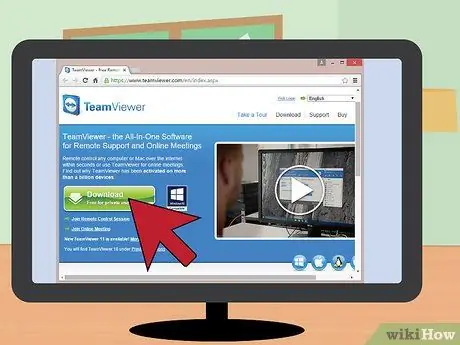
Step 7. Download the VPN software client for the home computer
Load the VPN client program for your home computer just like you would on a work computer. The installation process can usually be done yourself. Make sure you follow the given guidelines.
- If you encounter a problem, the IT department may ask you to bring the computer into the office so that the program can be installed and configured.
- If the IT department didn't install the software for you, a technician can provide you with take-home software and configuration guides.
- Call or email the company's support service if you have trouble installing or configuring the program.
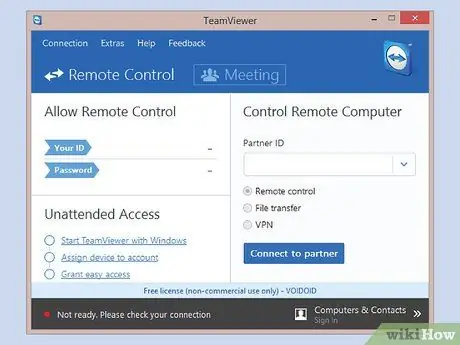
Step 8. Launch the VPN client software on the home computer
Go to Start → Programs, then find the name of the installed VPN. Double-click the VPN client to open it. You may be asked to enter a username and password.
For Mac users, go to the " Applications " folder and click VPN software
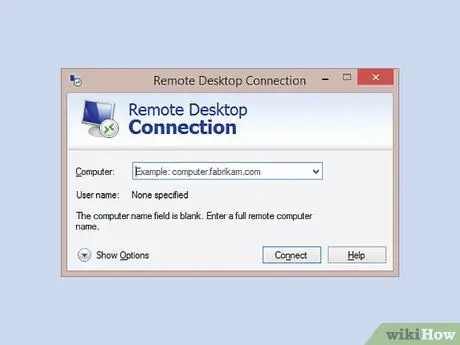
Step 9. Access Remote Desktop on home computer
Now you need to access Remote Desktop on your home computer to connect to your work computer. For Windows users, go to Start → Accessories → Communications → Remote Desktop. After you access Remote Desktop, type in the name of the work computer then press " Connect ". Now you can connect to your work computer and work from home.
- You can log in to the VPN before connecting via Remote Desktop.
- For Mac users, download "Microsoft Remote Desktop".
- If you have trouble finding your work computer on the network, contact the company's support services.
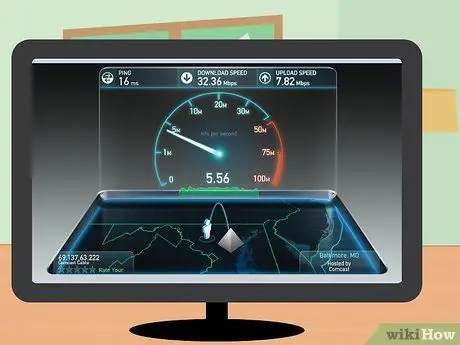
Step 10. Know that your home computer can run slower than your work computer
VPN connection speed depends on home internet speed. The faster your internet, the faster your VPN connection will be. Do not forget that the data sent and received is encrypted. The encryption process also slows down computer performance.
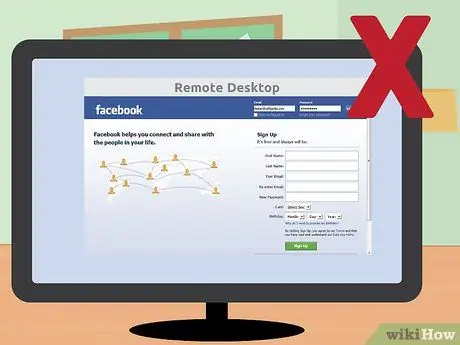
Step 11. Try not to use a VPN for personal purposes
Companies can see all your web activity while using a VPN. Therefore, it is best not to use a VPN when surfing for personal purposes so as not to get into trouble at work. You can simply click “minimize” on the Remote Desktop window if you want to do personal business.
Method 2 of 2: Gaining Remote Access without IT Department Help

Step 1. Try a service like Chrome Remote Desktop
If your company doesn't have an IT department or a VPN, you can still access and share information securely between computers. Chrome Remote Desktop is a free application that works on Windows and Mac. If you don't use Google Chrome yet, download the browser before using this app.
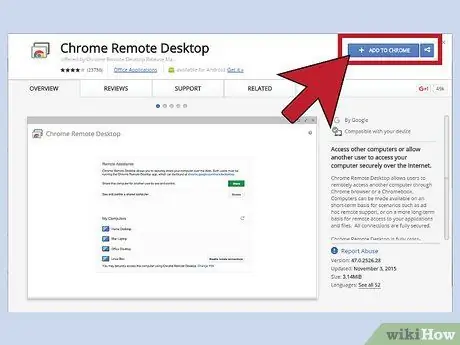
Step 2. Install Chrome Remote Desktop on the computer you want to connect to
Head to the Chrome Web Store to download the app. Click the blue " + Add to Chrome " button in the top right corner of the window. Click "Add" when prompted.
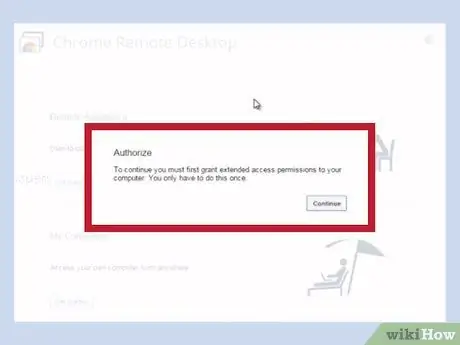
Step 3. Authorize Chrome Remote Desktop
When you first use the app, you will be asked to authorize it. Program authorization allows the app to see your email address, your Chrome Remote Desktop computer, and send and receive chat messages that allow multiple computers to communicate with each other.
The authorization request should not be asked every time the program is used
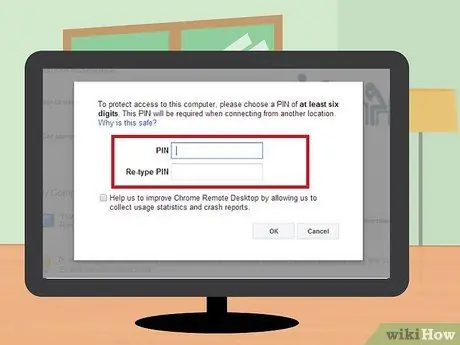
Step 4. Enable remote access on the computer
Create a Google Account (Google account) if you don't have one. Open a new label in Google Chrome, click “Apps” under the Chrome search bar, and open the Chrome Remote Desktop app. In the "My Computers" box, click "Get Started," then click "enable remote connections". You will need to install Chrome Remote Host Service.
- If using Windows, enter the PIN (according to your choice), then click " Yes " to install the hosting service. The host service will download and install automatically. Once installed, confirm your Google Account and re-enter the PIN. The activated computer should now be listed under " My Computers ". You will need administrative privileges to install the hosting service on the computer.
- For Mac users, Chrome will start downloading the.dmg installation. Click " Save ", and click " chrome remote desktop.dmg " in the download bar. Use the Finder function to find it and click "Chrome Remote Desktop.mpkg" twice. Follow all prompts to complete the installation, then return to Chrome and click "OK". Enter and confirm your PIN, then click "OK". A system preference dialog will appear, and you will need to confirm your account and PIN. If you have, the words "Remote connections for this computer have been enabled" will appear. Click "OK" and the computer is now enabled under "My Computers"
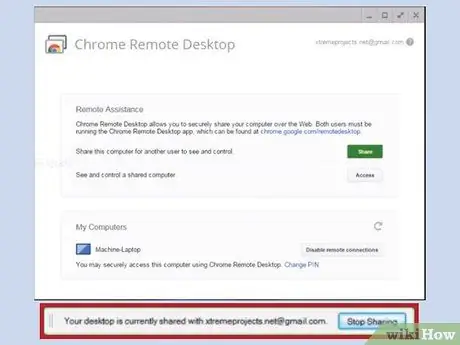
Step 5. Access your computer
The computer to be accessed must be turned on and connected to the internet. Open a new label in Google Chrome, click " Apps ", and open the Chrome Remote Desktop app. Click "Get Started" in the "My Computers" box and select the computer you want to access. Enter the PIN set for the computer and click "Connect".
To end a remote session, hover over the center of the page, click the drop-down bar, and click "Disconnect"
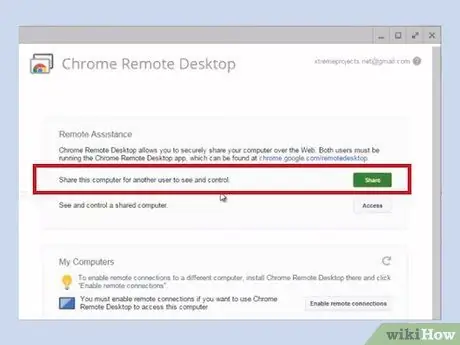
Step 6. Share the computer with others
You can share your computer with coworkers or friends if they also have Chrome Remote Desktop installed. Open the application on the computer, click the "Remote Assistance" box, and click the "Share" button. You will receive a unique access code that can be shared with others. After the other person enters the code, he or she will be able to see your computer screen.
- This passcode can only be used for one sharing session.
- Click " Stop sharing " or press "Ctrl+Alt+Esc" (Mac: Opt+Ctrl+Esc) to end the session.
- Be careful if you share with others. This other person has access to all of the computer's files, emails, and applications.






